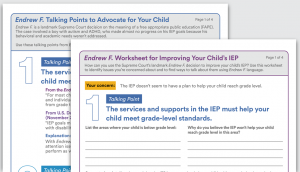 The Supreme Court’s Endrew F decision in 2017 is an opportunity to improve the services IEPs offer students. And it’s up to you as a parent to make the most of it. Doing so will not only help your child, but also the 1 in 5 kids with learning and attention issues in your community and beyond.
The Supreme Court’s Endrew F decision in 2017 is an opportunity to improve the services IEPs offer students. And it’s up to you as a parent to make the most of it. Doing so will not only help your child, but also the 1 in 5 kids with learning and attention issues in your community and beyond.
Endrew, a child with autism, attended public school from kindergarten through fourth grade. In April of 2010, Endrew’s parents rejected the 5th grade individualized education program (IEP) proposed by the Douglas County School District. Endrew’s parents believed the proposed IEP was basically the same as the previous IEPs under which their child’s academic and functional progress had stalled. Endrew’s parents subsequently withdrew him from public school and placed him in a private school that specialized in the education of children with autism. Endrew’s behavior in the private school setting improved significantly; his academic goals were strengthened and he thrived. This case arose because Endrew’s parents were unable to obtain tuition reimbursement for the cost of the private school placement.
On March 22, 2017 the U.S. Supreme Court (sometimes referred to as Court) issued a unanimous opinion in Endrew F. v. Douglas County School District Re-1, 137 S. Ct. 988. In that case, the Court interpreted the scope of the free appropriate public education (FAPE) requirements in the Individuals with Disabilities Education Act (IDEA).
Under this decision, the Supreme Court determined that, “[t]o meet its substantive obligation under the IDEA, a school must offer an IEP [individualized education program] that is reasonably calculated to enable a child to make progress appropriate in light of the child’s circumstances.” The Court additionally emphasized the requirement that “every child should have the chance to meet challenging objectives.”
Learn more about this decision in this Q & A from the U.S. Department of Education.
Understood, a nonprofit organization that was formed to help the millions of parents whose children ages 3–20 are struggling with learning and attention issues, has created a toolkit to help you advocate for your child and ensure they receive an appropriate and challenging IEP. This toolkit provides:
Learn more about advocacy by viewing the presentation and materials from Advocacy in Action—Sharing Your Story to Make Change, a workshop presented by Meghan Whittaker, National Center for Learning Disabilities‘ Policy & Advocacy Manager and Robert Stephens, Sr. Manager, Federal Relations, at EdRev Expo 2018.